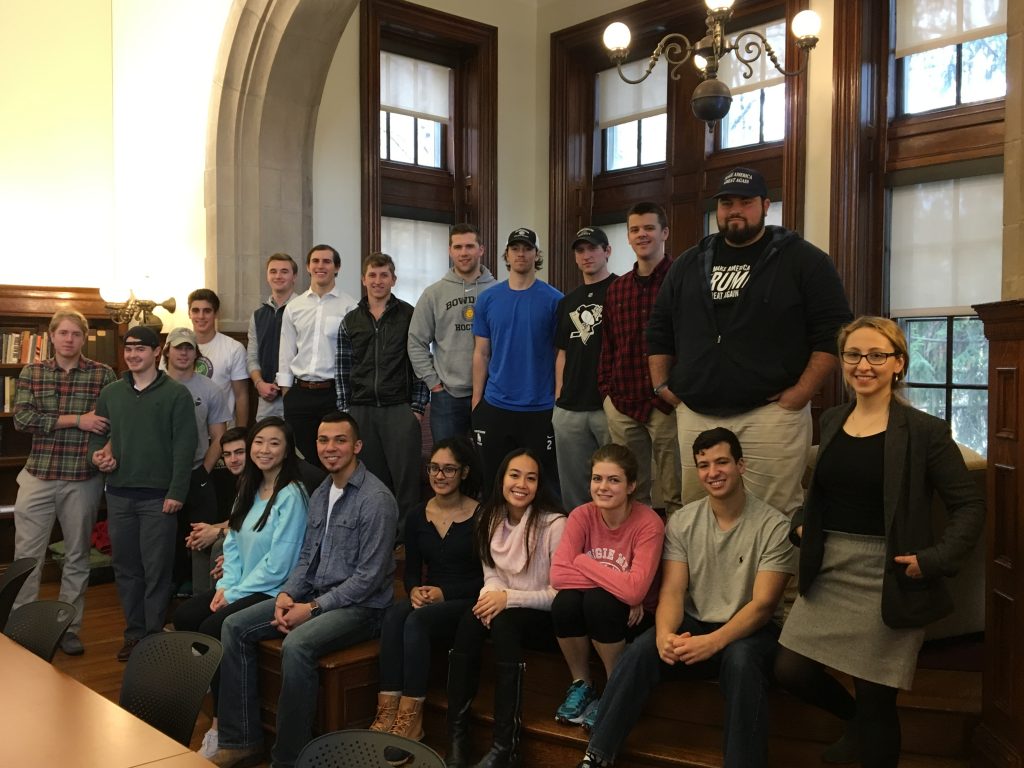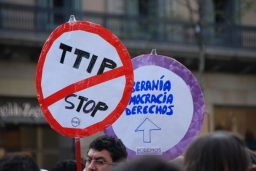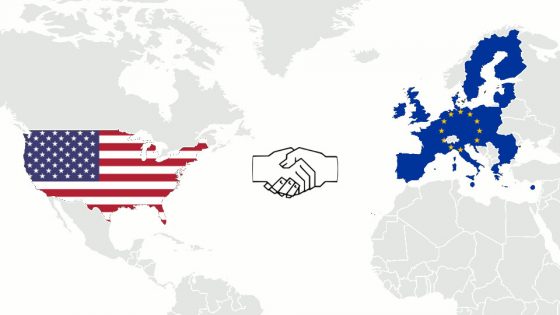Economics Students Tackle Free Trade Questions, as Historic Agreements Hang in the Balance
By Tom Porter
Assistant Professor of Economics Gonca Senel has been teaching her students about free trade, a topic that’s very much in the news at the moment. As part of her course The Economics of the European Union, Senel asked her students to weigh in on the key issues that policymakers in the US and beyond are dealing with. Below are some of their collective responses, which were submitted ahead of the US presidential election.
What are the supporters of the Transatlantic Trade and Investment Partnership (TTIP) saying?
NOTE: TTIP is a proposed trade agreement between the US and the EU, and if approved would create the largest trading bloc in history.
“Advocates of this deal believe that TTIP will create a strong alliance between the world’s democratic powers at an unstable time. Furthermore, they believe that establishing a mutual agreement between the world’s largest consumer markets will compel the rest of the world to follow a ‘barrier-free’ idea. The EU seeks to implement this idea with countries like Australia and New Zealand.
“More specifically, groups representing the textiles industry in Europe have voiced their support, leading up to the fifteenth round of negotiations of the deal. The European Confederation of the Footwear Industry, the European Apparel and Textile Confederation, and the Foreign Trade Association, are publicly calling for ‘strong political leadership’ from US and European politicians to negotiate TTIP. These groups believe that TTIP will help boost growth and create jobs, as well as help the retail industry realize its full potential.
“Some supporters, including EU trade commissioner Cecilia Malmstroem, feel negotiations will screech to halt if a deal is not completed before President Obama leaves office. Among the TTIP’s biggest proponents is Jean-Claude Juncker, president of the European Commission. Juncker argues that TTIP negotiations can aid the European economy while keeping small businesses and farmers in mind. Additionally, supporters claim that solidifying the partnership would demonstrate that the countries in the EU are all unified and have the same ideals in mind, especially following the UK’s Brexit vote earlier this year.”

What arguments are TTIP opponents making?
“There are many strong opinions against TTIP. One major argument concerns the Investor-State Dispute Settlement, or ISDS. This is a system that enables multinational corporations to sue governments of foreign countries for activities that could potentially damage their profits. Many in Europe are wary that TTIP could make it easier for overseas investors to pull sovereign countries into a legal battle. This reflects a growing sentiment, particularly among Europeans, that the TTIP would reallocate more power into the hands of a few major corporations.
“Another major concern for EU and US citizens is the lack of transparency with policy makers. The treaty has been nicknamed the ‘Trojan Treaty’ due to the high level of secrecy. TTIP has the potential to create a ‘race to the bottom’ where the standards for EU workers’ rights are lowered, due to the US refusing to acknowledge basic rights for laborers.
“Also, many of those who oppose the TTIP say that such trade agreements will hurt food standards in Europe. They believe that the import of US goods (with lower standards than those in Europe) will undermine the foods already sold in Europe. In addition to upholding necessary food and environmental standards, opponents of the TTIP believe that protecting domestic producers from economic competition is key. A wave of anti-globalization sentiment has surged in Germany as officials set out to protect regional food names such as Feta (cheese) and Parma Ham.
“Lastly, a study done at Tufts University predicted 600,000 European jobs would be lost due to increased international competition if TTIP is passed. The same study predicts a reduction of the labor share, meaning the share of total income collected by workers.”
Compare and contrast the Comprehensive Economic and Trade Agreement (CETA) and TTIP and assess CETA’s chances of being ratified
NOTE: CETA is a trade treaty between the EU and Canada. Supporters say that once applied, it will offer EU firms more and better business opportunities in Canada and support jobs in Europe. CETA is closer to realization than TTIP: It has been signed but not yet ratified.
“The TTIP and CETA are both described as ‘deep trade agreements’ that go beyond tariffs and quotas. The difference between the two is that the US wants ‘regulatory cooperation,’ which may lead to harmonization of standards—something which many in the EU are opposed to. Both deals face major political opposition, with environmentalists and antiglobalization activists both vocal in their criticism.
“However, now that it’s been signed we believe CETA will be ratified because it’s imperative that the EU finalizes a trade agreement to show the rest of the world, particularly the US, it’s a legitimate trading partner. Especially important was the recent decision of the German Social Democratic Party to endorse CETA, despite some sticking points. The ratification of the TTIP is less certain, with a lot depending on the outcome of the US presidential election.”

Describe some concrete examples of the benefits of free trade
“Free trade deals, including ASEAN, NAFTA, and the EU, have positively impacted welfare in participating countries. ASEAN is the Association of Southeast Asian Nations, which has ten members. Between 2000 and 2012, almost all tariffs were removed between the members of ASEAN. As a result, GDP, both total and per capita, more than trebled and the poverty rate more than halved.
NAFTA, the North American Free Trade Agreement, signed in 1992 between Mexico, Canada, and the US, has had similar effects. American trade with Mexico has increased more than five-fold, while trade between the three countries increased more than 300 percent to 1.1 trillion dollars in 2016. Fourteen million jobs depend on US trade with Mexico and Canada. Mexico has seen tremendous benefits from NAFTA in particular: increased direct investment has bolstered manufacturing productivity.
“The European Union is one of the largest single markets in the world. Despite recent doubts after Britain’s exit, evidence for the benefits of EU membership remains sound. Since its conception, member states with the exception of Greece have benefited from an average increase in GDP per capita of 12 percent.
Describe some concrete examples of the failures of free trade
“Deals such as NAFTA bring together countries with different GDPs and labor laws, creating problems in their domestic economies. Trade deals are typically designed to open up new markets, however, Mexico, the least developed of the three in the deal, saw its annual per capita growth drop to 1.2%. US-subsidized corn brought down producer prices, and small Mexican farmers were subsequently unable to hold their competitive advantage: about two million have been shut down since 1994 because of NAFTA.
“Free trade deals only open markets to large, multinational corporations that benefit from economies of scale. In Mexico this has led to downward wage pressures through the creation of so-called Maquiladoras, which are special economic zones where multinational corporations (MNCs) exploit cheap Mexican labor. MNCs frequently establish manufacturing sites in lesser-developed countries to minimize production costs, and freely relocate these industries without providing a boost to the host economies. In this instance, they import component parts duty-free from abroad and assemble them within NAFTA to evade tariffs when entering the US economy, bypassing the technological diffusion often associated with foreign direct investment. NAFTA has impacted workers on both sides of the border. As MNCs shifted low-skilled jobs overseas, US manufacturing unemployment increased, and displaced workers were unable to find comparable jobs. This necessitated the government’s implementation of ‘trade-adjustment assistance,’ which provides wage insurance, prolonged unemployment benefits, and advanced training, with only meager returns.”
November 9, 2016: Prof Gonca Senel writes:
“Donald Trump’s victory in the presidential elections marks a new start for the US’s economic relations with the rest of the world, and TTIP’s fate will very much depend on his new trade policies. If Trump follows his initial agenda, it is very likely that existing trade agreements, as well as TTIP, will be reconsidered, and in this environment it is very important for students to be able to analyze different aspects of such trade deals and make assessments for their future.”
Students taking part in this class are:
Nicolas Aldeanueva, 2020
Heather Chan, 2017
Theodore Christian, 2019
Seth Cooper, 2019
John Curtin, 2018
John Dana, 2019
Paul Delancy, 2017
Wendy Dong, 2018
Cullen Geary, 2018
Eric Giesler, 2018
Hossam Hamdan, 2017
Yuta Kobayashi, 2019
Matthew Lison, 2018
Ryan Monahan, 2018
Jordan Moskowitz, 2016
Faria Nasruddin, 2020
Troy Peters, 2019
Gilbert Roddy, 2018
Austin Stern, 2018
Harry Summers, 2016
Ezra Sunshine, 2019
Grant Urken, 2019
Jessica Weiss, 2017



